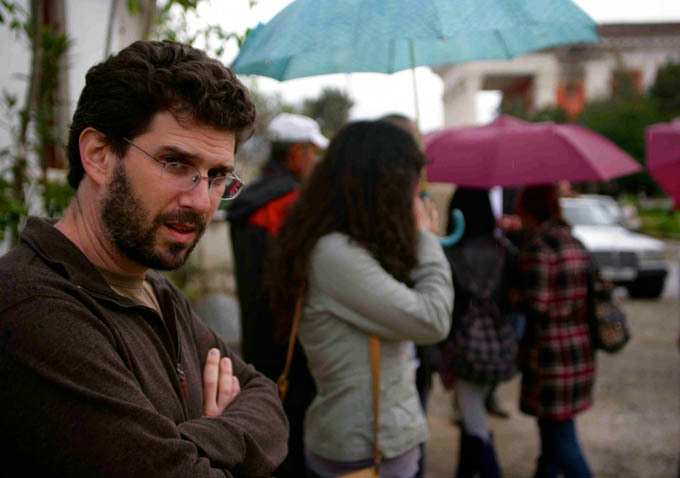Joshua Marston Draws Blood

ABOVE: JOSHUA MARSTON
An eye for an eye may be an archaic form of justice, but in The Forgiveness of Blood, director Joshua Marston explores how the ancient tradition can wreak havoc on a family caught between the old ways and the new. Shot in Albania, the film follows Nik, a high school student with a penchant for Facebook, who becomes the victim of a centuries-old law after his father kills a neighbor. According to the law, the victim’s family is owed “blood” and could kill Nik as retaliation. The Forgiveness of Blood is Marston’s sophomore effort, after his acclaimed debut film Maria Full of Grace, which followed the harrowing journey of a drug mule.
For his second film, Marston wanted to explore the ramifications of blood feuds after first discovering them in a newspaper article. For research, Marston, an American, spent seven months in Albania immersing himself in the culture. Rather than resetting the film somewhere more accessible or having the actors speak English, Marston shot the entire film in Albanian. Casting a host of unknown actors, including Tristan Halilaj as Nik and Sindi Lacej as Nik’s younger sister Rudina, Marston managed to make a film that is fictional, but never feels fake. We caught up with Marston to talk about his logistical challenges and the perils of doing stunt work in Albania.
GILLIAN MOHNEY: I heard you first read about blood feuds in the newspaper, what about them made you want to make a film?
JOSHUA MARSTON: The thing that struck me was not just the blood feuds but specifically the idea that people were stuck inside the house for years and years on end. That that’s happening now in present-day Albania. Also happening now in present day Albania are cell phones and video games. That contrast of those two things is most interesting to me.
MOHNEY: Coming off of your last film Maria Full of Grace, what made you want to do a film in Albania, all in Albanian?
MARSTON: There were a bunch of other things in between that were going to happen that didn’t… What was great about this movie was that I could immediately imagine a narrative about a 17-year-old boy, who’s got a crush on a girl and wants to be out in the world, through no fault of his own has to be stuck inside the house. Creatively speaking, it was fascinating. It was also attractive because I can imagine a film that was relatively simple from a production point of view.
MOHNEY: Working with an Albanian cast in Albania, did you run into any logistical problems?
MARSTON: Logistically speaking, casting was easier there than it would have been here. We were able to do something we could never ever do in the United States. We made a friend, who is the head of the local ministry of education in northern Albania. Basically every day we’d send her a text message and she would text us back with the name of the school and a village. They would open up their doors and we would spend the day interviewing students.
MOHNEY: You found great kids to cast.
MARSTON: The kids were for the most part very open and fascinating and wanted to be part of this cool foreign project. What was difficult was that there were no high school theater programs; there were virtually no theater companies, even outside of the schools.
MOHNEY: What struck you about Tristan and Sindi?
MARSTON: They’re obviously very smart, very receptive, very creative, and very open. Those are really the qualities that I was most looking for. They’ve got good memories. One of the things I do when they audition is I ask them to tell stories or to recall certain parts of their life to see whether or not they have an ability to stand outside what’s happened to them and narrate it… They were just very good at that. When I put them together, I would then do these improvisations [and] they felt like brother and sister.
MOHNEY: You come from a journalistic background—
MARSTON: Well, I want to find a way of stopping people from describing me like this… I’m interested in journalism, I would like to do journalism, I would say I have a journalistic bent.
MOHNEY: Do you find being an American and immersing yourself in a foreign culture makes you a better filmmaker?
MARSTON: It’s not that I don’t want to make movies here, but there is something fascinating and enjoyable about going someplace I don’t know and learning about it. In many respects the most stimulating part of the process is the very initial phase, where I’m going to Albania for a month and interviewing people and talking to them. There’s such a steep learning curve, when everything is new and fascinating.
MOHNEY: Was there anything particularly difficult? You don’t have a lot of stunts, but you do set a barn on fire.
MARSTON: We’re just lucky that more didn’t catch on fire… We had one guy who was our pyrotechnic expert. He had been a pyrotechnic expert on a film many, many years ago, and he currently was working as a taxi driver.
MOHNEY: Where did you find him?
MARSTON: I don’t know where we found him. But he showed up in a jumpsuit and a fire helmet and we were discussing whether or not there was a risk in the fire leaping from the barn to the house. He looked at the gap that we created and said “No, you’ll be fine, that’s okay.” I turned to the other people and was like, “See we’re good. We’ll be fine.” And then I turn around and I realize he’s been standing six feet away from the gasoline-doused barn smoking a cigarette. I was like, “Okay, maybe he’s not the most reliable.”
THE FORGIVENESS OF BLOOD IS OUT IN LIMITED RELEASE FRIDAY.






